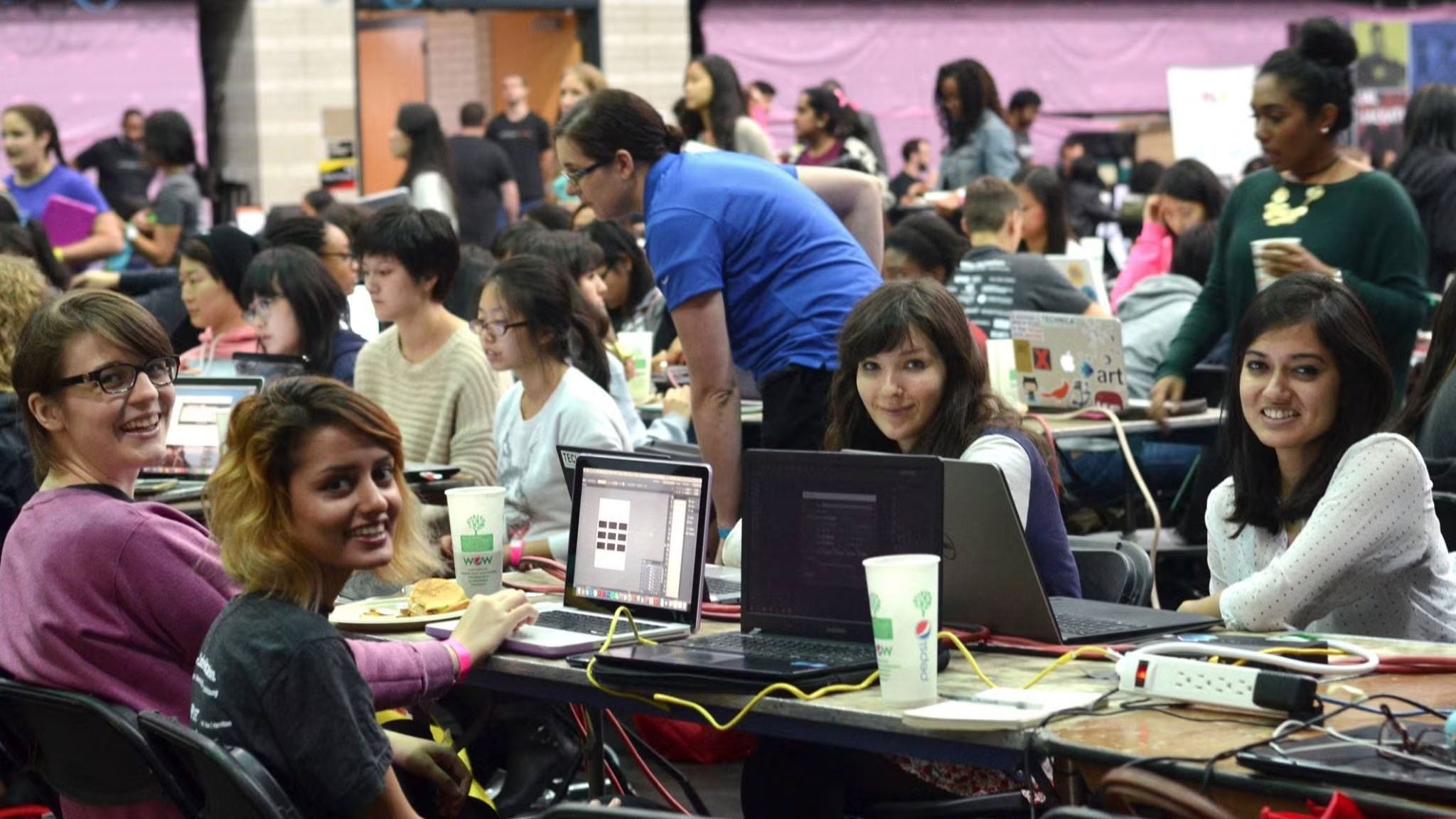Hackers dive into the quantum realm at Technica 2025

On the weekend, over 400 in-person and 100 virtual participants gathered at UMD for Technica 2025, the world's largest hackathon celebrating underrepresented genders. The 24-hour event welcomed everyone from beginners to experienced hackers, offering a supportive environment for collaboration, learning new skills, and developing projects.
This year, the hackers also dived into the world of quantum physics. The workshop "Introduction to Quantum Computation", held by QLab's Thomas Barthel, introduced the hackers to the paradigm-shifting potential of quantum technology.
The Need for Quantum Speed
Dr. Barthel kicked off the workshop by addressing the fundamental question: Why quantum computers? He explained that classical computers are hitting computational limits when tackling problems involving vast, complex systems, such as simulating molecular interactions for drug discovery, finding quantum materials like high-temperature superconductors, solving logistics and finance optimization problems, or factoring large numbers. Additionally, Moore's law - the observation that the number of transistors on integrated classical circuits doubled approximately every two years - hits physical limits as miniaturization reaches the realm of quantum physics. However, on dedicated quantum devices, the bizarre rules of quantum mechanics could be leveraged to solve some computational problems polynomially or even exponentially faster.
Quantum vs. Classical States: Massive Parallelism
The core of the quantum advantage lies in the fundamental difference between classical and quantum information.
- Classical bits store information as a definite bit strings [0,0,0,...], [1,0,0,...], [0,1,0,...], [1,1,0,...] etc.
- Quantum bits (qubits) can exist in a superposition of all these classical states simultaneously.
Such superpositions, along with quantum entanglement, allow a quantum processor to explore multiple computational paths at once—a concept Dr. Barthel highlighted as massive parallelism. This capability enables quantum devices to process information in ways that are fundamentally impossible for their classical counterparts. The hackers also learned about universal gate sets that form the basic building blocks of both classical and quantum circuits.
Transformative Quantum Algorithms
The workshop then delved into specific quantum algorithms that demonstrate the potential for revolutionary speedups by contrasting their complexity scaling with classical methods.
- Shor's Algorithm: Can factor large numbers exponentially faster than the best known classical algorithms. This has profound implications for public-key cryptography.
- Grover's Search Algorithm: Offers a quadratic speedup for searching unstructured databases with potential applications concerning, for example, the identification of patterns in genomic sequences or astronomical catalogs, complex Boolean satisfiability problems, route and portfolio optimization, cryptography attacks, and machine learning.
- Harrow–Hassidim–Lloyd (HHL) Algorithm: Provides an exponential speedup for solving sparse systems of linear equations, which is a key component in machine learning, data analysis, and various scientific simulation methods.
The discussion also covered promising approaches like quantum annealing and the quantum approximate optimization algorithm (QAOA) for which, so far, no general quantum advantage has been proven.
The Hardware Race
Attendees were given a rundown of the diverse experimental quantum computation platforms currently being developed:
- Circuits of superconducting qubits: The technology used by companies like Google and IBM, operating at cryogenic temperatures.
- Ion-trap devices: Using individual charged ions suspended and controlled by electromagnetic fields as used by IonQ and Quantinuum.
- Ultracold atoms in optical lattices and tweezers: Using lasers to trap and arrange neutral atoms - a promissing approach with impressive recent advances as demonstrated by QuEra, Pasqal, Atom Computing, and Infleqtion.
- Photonic devices: Using photons, or particles of light, to perform quantum computation as developed by Xanadu and PsiQuantum.
- Coupled quantum dots: Often referred to as "artificial atoms", using well-established semiconductor technology.
The Error Challenge
A crucial final topic was error correction. Dr. Barthel explained that quantum systems are prone to errors due to experimental noise and imperfections as well as the coupling to the surrounding which leads to decoherence. The workshop contrasted classical error correction (which relies on redundancy, like repeating a bit) with the more complex process of quantum error correction, which protects superpositions without measuring them. The session concluded with a discussion of the threshold theorem, a theoretical benchmark that suggests fault-tolerant quantum computation is possible if the error rate of individual gates can be kept below a specific, albeit stringent, threshold.
The "Introduction to Quantum Computation" workshop left the Technica hackers not only with a solid grounding in quantum theory but also an exciting perspective on the future challenges and opportunities in this rapidly evolving field. Many thanks to the organizers and participants for the invitation and fantastic event!